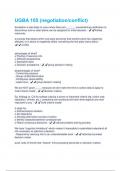Exam (elaborations)
UGBA 105 (negotiation/conflict) Questions + Answers Graded A+
- Course
- Institution
Escalation is less likely to occur when there are ______, overwhelming justification to discontinue and no clear blame can be assigned for initial decision - ️️limited resources a process that begins when one party perceives that another party has negatively affected, or is about to negativ...
[Show more]



